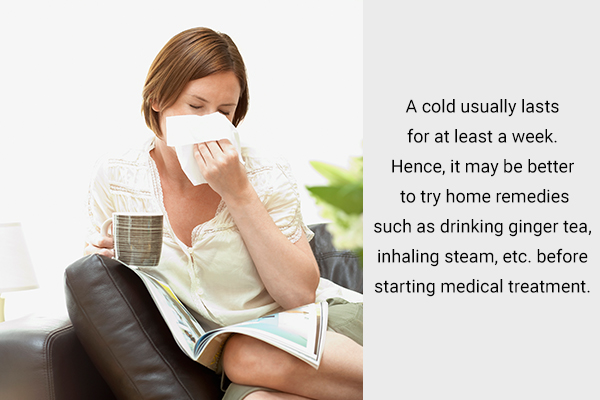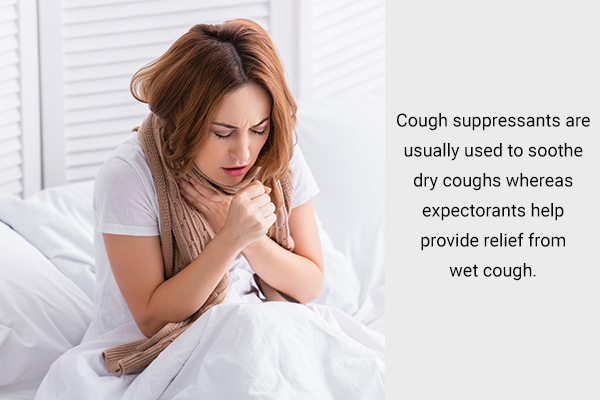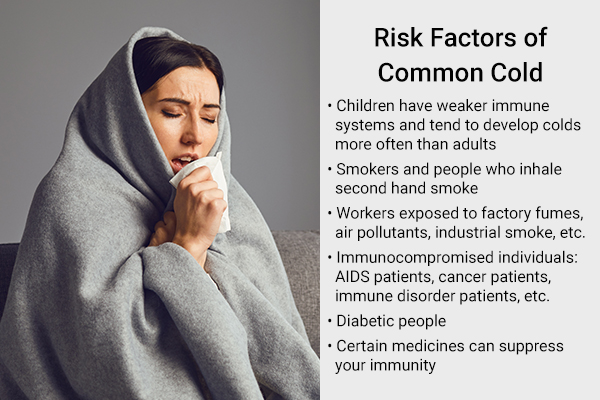In this article:
The common cold refers to a set of symptoms that affect the upper respiratory organs: the nose, nasal cavities, and windpipe.

It is caused by many different kinds of viruses and hence is difficult to become immune to. A cold usually lasts for 1–2 weeks and may occur multiple times a year. (1)(2)
Causes of the Common Cold
The common cold is caused by a number of viruses.
It can easily spread from one person to another via airborne droplets that are sneezed or coughed. It can also spread via viral particles left on surfaces, such as doorknobs, by a sick person. (3)(4)
Symptoms of the Common Cold
You may start developing symptoms of a cold a few days after infection. Common symptoms include:
- Sneezing
- Coughing
- Runny nose
- Sore throat
- Mild fever
- Headache
- Body aches
The symptoms of the common cold and flu may be similar, but the flu generally causes more severe body aches, high fever, etc. (3)
Treatment for the Common Cold

A cold usually lasts for at least a week. Hence, it may be better to try home remedies such as drinking ginger tea, inhaling steam, etc., before starting medical treatment.
If your cold gets worse or doesn’t seem to resolve after 3 days, you can take a number of over-the-counter medicines for it.
Note: Do not give any over-the-counter medicines to children under 6 years of age unless advised by a doctor.
1. Decongestants
Decongestants are available in the form of pills or nasal sprays. Do not use a decongestant spray for more than 3 days as it can worsen the condition.
Most cough medicines contain a decongestant.
Note: Oral decongestants should not be used without the advice of a doctor in patients suffering from glaucoma, diabetes, or hypertension.
Decongestants can have side effects and should be given to children with caution. Do not give them to children under 6 years of age. Children below 12 years old should not be given decongestants for more than 5 days. (5)
2. Antihistamines
Antihistamines such as cetirizine, fexofenadine, and loratadine can help provide relief from a runny nose by drying up the nasal cavities.
3. Cough medicines

There are many different kinds of cough medicines, some available over the counter and some by prescription. Cough suppressants are usually used to soothe dry coughs, whereas expectorants help provide relief from wet cough.
4. Pain relievers
Painkillers such as aspirin, acetaminophen, and ibuprofen can be used to provide relief from headaches or body aches.
Note: Children below 18 years of age should not take aspirin due to the risk of a rare but serious illness called Reye syndrome. (4)
Diagnosing a Common Cold
The common cold and flu have very similar symptoms. Yet, most doctors can tell them apart from the severity of their symptoms – especially the presence of a high fever.
Most cases of common colds are treatable with over-the-counter medicines and do not require a visit to the clinic.
If your cold does not resolve even after a couple of weeks or you have severe symptoms such as difficulty breathing due to a stuffed nose and severe cough, you can consult a doctor for a diagnosis.
The doctor may ask about your medical history, observe your condition, and ask you to undergo some blood tests or a nasal swab test for proper treatment.
Risk Factors of Common Cold
Some people are more likely to develop frequent colds. These include:

- Children, who have weaker immune systems and tend to develop colds more often than adults
- Smokers and people who inhale secondhand smoke
- Workers exposed to factory fumes, air pollutants, industrial smoke, etc.
- Immunocompromised individuals, such as people with AIDS, cancer, and immune disorders
- Diabetic people
- People who are taking medicines that can suppress immunity, such as corticosteroids (6)(4)
When to See a Doctor
Consult a doctor if your cold does not resolve after a couple of weeks or you have the following symptoms: (4)
- Severe headache
- Difficulty breathing
- High fever
- Severe cough
- Diabetes, hypertension, AIDS, or other chronic issues that may delay healing
- Severe chest pain
- You do not notice any improvement after 3-4 weeks
- Your baby (below 3 months of age) is sick
Final Word
The common cold, as the name suggests, is a common problem everyone in the world suffers from occasionally. It is usually nothing to worry about and resolves on its own most of the time.
You can drink hot teas and take over-the-counter medicines to make yourself feel better in the meantime. (7)
 Continue Reading6 Home Remedies for Common Cold and Preventive Tips
Continue Reading6 Home Remedies for Common Cold and Preventive Tips
- Was this article helpful?
- YES, THANKS!NOT REALLY


